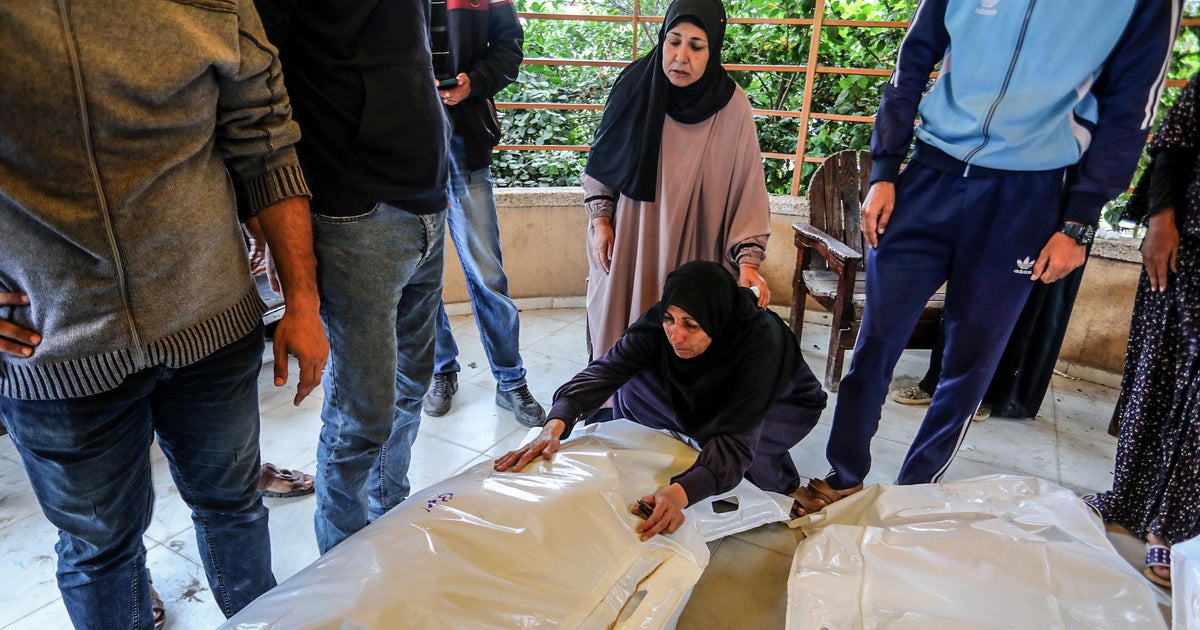Israel's far-right lashes out at Biden over Gaza war stance as Netanyahu vows Rafah offensive will happen
Tel Aviv — Some of Israel's most senior far-right politicians lashed out Thursday at President Biden after he warned the White House could withhold more weapons shipments to the Israeli military if it launches a major military ground assault on Gaza's southernmost city of Rafah.
Israel's ultra-nationalist, firebrand National Security Minister Itamar Ben-Gvir posted a short message on social media suggesting, with a heart emoji, that the militant group Hamas, which Israel has been at war with for seven devastating months in Gaza, loved Mr. Biden for his threat to withhold the weapons.
Parliamentarian Dan Illouz, a lawmaker from Prime Minister Benjamin Netanyahu's own Likud party, said the U.S. leader's action, "not only jeopardizes Israel but the entire free world."
Israel's President Isaac Herzog, considered a more moderate politician, who is not a member of Netanyahu's far-right coalition government, appeared to chastise his more extreme colleagues on Thursday. Speaking at an event to mark the allies' victory in Europe over Nazi Germany during World War II, Herzog lauded Israel's "greatest ally the United States of America," thanking Mr. Biden by name for his support "from the first day of the war."
"Even when there are disagreements and moments of disappointment between friends and allies, there is a way to clarify the disputes and it is beholden upon all of us to avoid baseless, irresponsible and insulting statements and tweets that harm the national security and the interests of the State of Israel," Herzog added.
Speaking Wednesday to CNN, Mr. Biden said it would be "just wrong" if U.S.-supplied weapons were used in attacks that led to mass civilian deaths in a full-scale Rafah ground offensive. If Israel does go ahead with such an operation, he said the U.S. was "not going to supply the weapons and artillery shells used" for it.
U.S. officials have confirmed that the Biden administration paused a weapons shipment to Israel last week — of 1,800 one-ton bombs and 1,700 500-pound bombs — over concern that the Israel Defense Forces would drop them on Rafah.
The southern Gazan city is one of the most densely-inhabited places on the planet, with an estimated 1.4 million Palestinians having sought shelter there from across the decimated territory.
The IDF ordered people in the eastern part of the city to leave this week, sparking a desperate exodus of thousands — many of whom had already been forced to flee from other locations multiple times.
IDF tanks rolled in to take control of the Gaza side of Rafah's crucial border crossing with Egypt on Tuesday, soon after the evacuation order was issued, and Israel said it was carrying out "a precise counterterrorism operation to eliminate Hamas terrorists and infrastructure" in the area.
"They're not going to get our support if in fact they go into these population centers," said Mr. Biden. "We're not walking away from Israel's security — we're walking away from Israel's ability to wage war in those areas."
Mr. Biden stressed that the U.S. would, "continue to make sure Israel is secure in terms of Iron Dome and their ability to respond to attacks that came out of the Middle East recently."
Netanyahu has said in recent days — amid mounting pressure from the U.S. and other global partners to limit the scope of operations in Rafah — that if "Israel is forced to stand alone, Israel will stand alone."
He's vowed to go ahead with the Rafah operation, which he's said for weeks is necessary to destroy hundreds of Hamas fighters holed up in the city. Rafah is considered the last stronghold of the group that ruled Gaza for almost two decades, before it sparked the current war with its deadly Oct. 7 terrorist attack on Israel.
Israel says Hamas killed about 1,200 people with that assault and took some 240 others hostage. About 100 of those captives are still believed to be alive in Gaza, including five U.S. nationals.
The enclave's Hamas-run Health Ministry, meanwhile, says Israel's retaliatory war has killed almost 35,000 people. Gazan officials do not distinguish between combatant and civilian casualties, and the IDF, without offering evidence, claims to have killed about 10,000 terrorists with its response to the Oct. 7 attack.
Since Israel heralded the start of its Rafah operations this week, frightened Gazans have fled daily from Israeli airstrikes, flooding the city's last functioning hospital, the Kuwaiti Hospital, with the dead and wounded.
"The health situation in Rafah is now very miserable," Dr. Jamal Al-Humss, the hospital's director-general, told CBS News. He said about 300,000 people in Rafah are now relying on the facility, which he warned was overflowing and understaffed.
In recent days, Hamas — long considered a terrorist group by the U.S. and Israel — has continued to launch rocket and mortar attacks from Rafah. One strike on Sunday killed four Israeli soldiers.
Israeli national security expert Chuck Freilich, at the Institute for National Security Studies at Tel Aviv University, accepts that there are likely still four Hamas battalions operating in Rafah. But speaking with CBS News on Thursday, he argued that Israel had already won and lost the war with Hamas.
"If you look at it from a purely military perspective, I think Israel won the war by the middle of December," he said. "We had essentially destroyed Hamas as a military force."
"At the same time, if you mean the overall strategic picture of the war, Israel may have lost. Its international standing is bad, and now we've seen this emerging divide with the United States," said Freilich. "For Hamas, it's an incredible achievement, and for us, it's a very severe problem."
CBS News' Tucker Reals contributed to this report.






